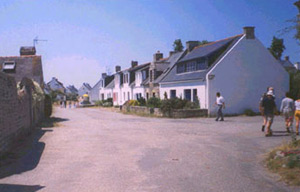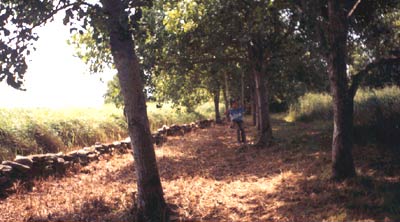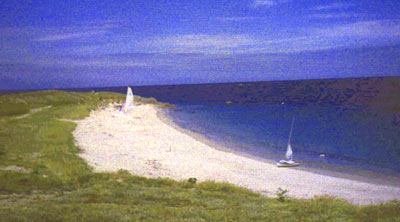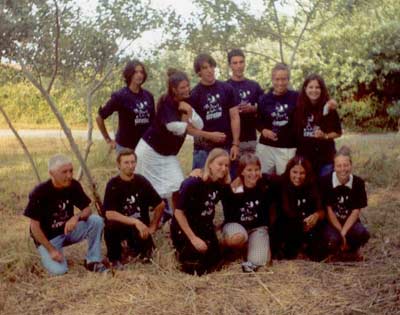Volunteering in Ile D’Hoedic
Blissful in remote isolation, Ile D’Hoedic surrenders to iridescent blue waters. An hour-long ferry ride departing from Quiberon, France’s western port city will take you there. The island is a micro-society infused with French culture, un-Parisian camaraderie, and whimsical natural perfection.
I was privy to this esoteric community through a volunteer project. Working with ten other international volunteers to restore a stretch of land ruined by a storm, we comprised fifteen percent of the island’s population. For three weeks, a circumference of beaches stretching eight kilometers set our boundaries. Confinement never felt so good.
Peacefully centered on the island, a pond lined with fallen trees, overgrown weeds, and an ancient stonewall anticipated my group’s arrival. Days were spent with machetes, saws and picks. We cleared out the land adjacent to the pond and re-erected the fallen stonewall that had bound the pond for 500 years. The ultimate result was an area tourists and locals could go to relax, bird watch, and escape. Placid and welcoming, the space yielded undeniable appreciation.

But the manual labor was only a small part of my Ile D’Hoedic experience; I had crossed into a world where cars were not permitted, where dogs roamed freely, and where men played bocce ball in the middle of the road. The town pub was open as long as people were drinking. There were no police. Traditional French homes had all the amenities of the mainland, with the exception of locks on the doors. We drank on the beach with locals and listened to French folk music played by an elder guitarist. Every night was different but every night was filled with welcoming residents, music, and wine. Within a day the island felt like home.

The volunteers lived in Le Fort, in an army barrack built in the 1840s for the French-English War that was only completed after the war ended. Le Fort welcomed us with a large kitchen and common area—a stage for cultural conversation, card games, drinking, singing, and dancing. We all slept in the same dorm room; another dorm room down the hall housed visitors on the weekends.
Of the tourists, the most notable was a group of forty French people who took over Le Fort in celebration of a triple 30th birthday, bringing with them abundant amounts of food, a DJ, and an open invitation to everyone on the island to join in their festivities. And so we did. Their first night featured a party with endless free liquor, accompanied by non-existent noise violations and time constraints. It was a party unlike any other I had experienced.

Since Le Fort was full, my volunteer group camped out on our favorite beach alongside other weekend tourists, a dark and starry fifteen-minute walk away. I like to think it was the crashing of the waves and not the lingering intoxication that lulled me to sleep.
The birthday group extended the same invitation the second night, but sluggishness combined with threatening weather prevented a few of us from attending. Instead, we sat at the western most point of the island, dazzled by the piercingly intense bolts of orange lightening dancing across the ocean in simultaneous outbursts. Winds circled in mocking disarray. As the orange streaks fiercely narrowed in and the thunder echoed, we knew the time to leave this magical display had arrived.
Fervently fighting the wind to reclaim our campsite, we trudged across the grass as sand swirled into our faces. Fueled by adrenaline and anguish, we arrived at our wilting tents. We had to think fast. It was either grab as much as we could and run to the center of town in hopes of finding a covered place to sleep, or reinforce our tents and try to make it through the night. We opted for the latter and split up: three people in two tents. We lined the inside of our tents with backpacks in hopes of stabilizing the nylon walls. There was barely enough room for our bodies. No sooner had we squeezed into our shelter, than the rain hammered on our roofs. Mercifully, our wavering confine refused to succumb to the wrath of the weather.

I barely slept that night, but at daybreak, with our tents still standing and our bodies dry, I felt empowered. We later discovered that the others found shelter at the vacant Presbyterian church in the center of town. Although I felt a little envious of their good night’s sleep, I look back on that night with victory.
Three weeks on an island that is two kilometers wide may seem daunting to those tattooed by city life. But it was not enough for me. Ile D’Hoedic has all the elements of a city, but on a small scale, in a beautiful place, and in the middle of the ocean. It is a place for travelers who want to go somewhere the guidebook has never mentioned and live by their own rules. You can do as much or as little as you want and feel like it’s the perfect thing to do. If you’ve ever wondered what the world looks like with the moon as your only light, then Ile D’Hoedic anticipates your footsteps. I dream of the day I can once again run naked into the ocean in the middle of the night and unleash my spirituality that hides in mainland conformity. Ile D’Hoedic awaits my arrival, and I hope it awaits yours.
